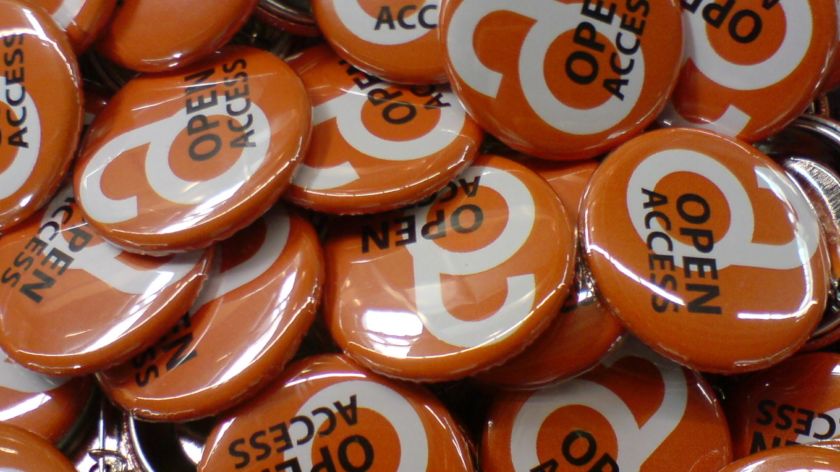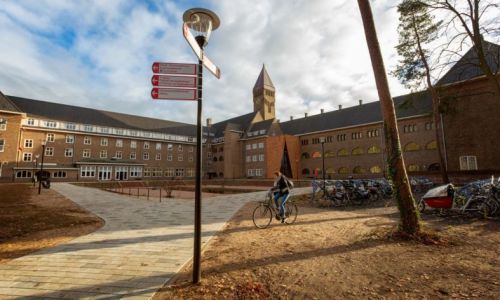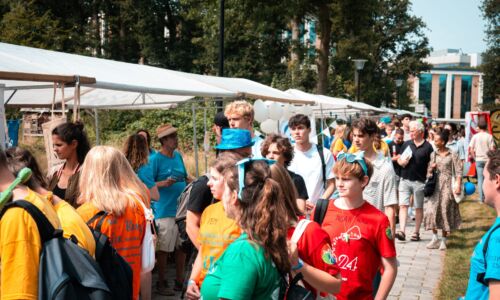Publications available for free even sooner
-
 Foto: H.Pampel/Flickr (CC-SA)
Foto: H.Pampel/Flickr (CC-SA)
With 'You share, we take care!', the University Library is putting even more pressure on commercial publishers. This pilot ensures that publications by Nijmegen researchers are available for download after six months, regardless of any contractual agreements with journals.
What sounds like a slogan for Uber or AirBnB, is actually one pursued by the University Library: ‘You share, we take care!’ As part of this project, the University Library hopes to encourage researchers to share scientific articles and book chapters six months after publication, regardless of any restrictive publishers’ guidelines.
Many publishers have set up a paywall to restrict access to scientific articles. This means access is only granted to paid subscribers, and most university subscriptions are extremely expensive. Radboud University, for example, spent more than 3.8 million euros on scientific publications in 2015 alone.
Young researchers are particularly interested in this arrangement, believing it to be high time for a change.
Fuelled by high costs and the belief that publicly funded research should be freely accessible, a counter-movement known as Open Access has emerged, spearheaded by universities, researchers and financiers. The goal of this movement is to eliminate subscription fees and replace them with a system whereby researchers pay to publish their work.
With ‘You share, we take care’, Dutch universities are upping the pressure on commercial publishers. The national pilot project initiated by the Association of Universities in the Netherlands (VSNU) was launched this year.
Taverne Amendment
The project takes the 2015 Taverne Amendment from the Dutch Copyright Act as its starting point. ‘This law states that researchers are entitled to make short scientific works – such as articles and book chapters – available to the public after a reasonable period of time,’ explains Natalia Grygierczyk, director of the University Library.
The law overrules all contractual agreements between researchers and publishers. By participating in this pilot, the University Library hopes to discover new ways to help researchers apply this legal framework. ‘We take care of everything, hence the project name,’ says project leader Gonny Kremers. ‘We search for and download the PDFs and make them available in the Radboud Repository.’
Blacklist
Kremers and her colleagues actively approached several Nijmegen researchers from all faculties (except the medical faculty, which does not fall under the VSNU) to ask whether they would be willing to participate in this pilot and make their publications from 2017 and 2018 available to the public. Kremers also received several applications from interested researchers. ‘We currently have 29 participants. Young researchers are particularly interested in this arrangement and believe it’s high time for a change.’
Researchers who were not willing to participate said they were afraid of jeopardising their relationship with their publishers. ‘Many researchers have built good relationships with companies like Kluwer, after having published books or served on editorial boards,’ says Kremers. Others are afraid of being blacklisted by the journals, under pressure from the publishers. According to Grygierczyk, this fear is unfounded. ‘The editors of scientific journals work independently.’
Publishers keeping it on the down low
The participating researchers signed a contract with the university, which states that the university will cover any litigation costs should a publisher sue an individual researcher. ‘The law does not specify what a ‘reasonable period of time’ is,’ says Grygierczyk. ‘There is no case law on this yet. The pilot decided on six months, which was also communicated to the publishers.’
So far, the publishers are exercising restraint. ‘No one’s been sued yet,’ says Grygierczyk. The VSNU will evaluate the pilot in December to decide whether it warrants a follow-up.
Roald Dijkstra (Greek and Latin Language and Culture): ‘It involves public funds’

‘I signed up for the pilot myself. I think it’s strange that we do almost all of the publication work as researchers, as members of the editorial board and as peer reviewers, yet the publishers are the ones making a profit. They do virtually nothing. Plus, it involves public funds.
The participation process went smoothly. I recently stopped by the University Library, where they explained the project to me. A few of my publications couldn’t be included – books, for example – but others are now available in the Radboud Repository.
In most cases you can post the latest, unformatted version of an article online, but this isn’t very convenient from a scientific standpoint. You want to be able to link to a final, published version with the right page numbers.
More importantly: researchers are just people and publishers don’t always take the time to email them for a PDF. The more there is available digitally, the better. As far as I’m concerned, this project should continue to grow. Now I just hope that people will actually read my articles.’



